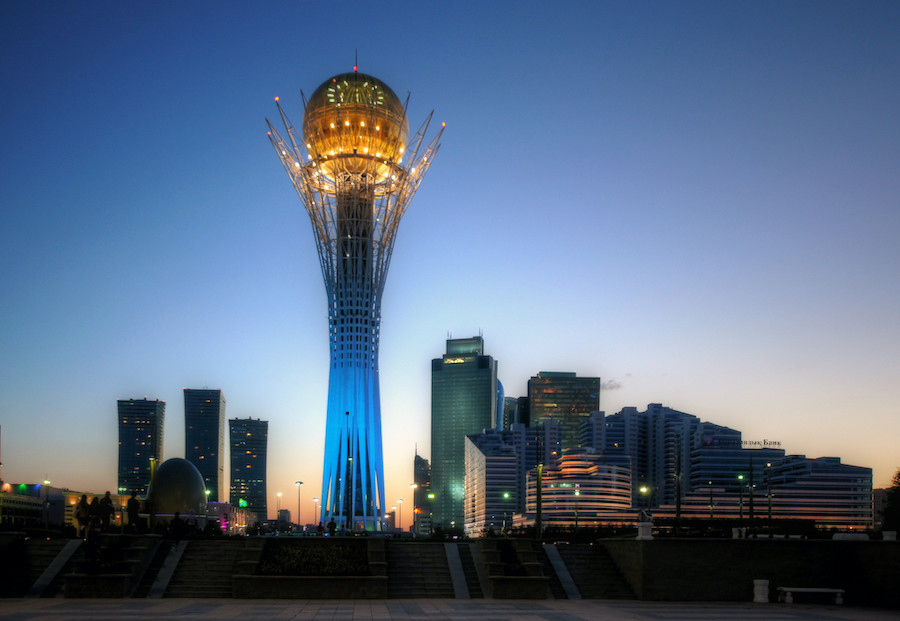Although the global economy has been experiencing disastrous effects from the ongoing COVID-19 pandemic and oil price fluctuations, the United States and Kazakhstan remain strong partners when it comes to trade and economy.
Officials from the US Chamber of Commerce announced on Tuesday the launch of the US-Kazakhstan Business Council (USKZBC) to encourage economic and commercial cooperation between the two nations, according to a statement issued by the organization.
“The US Chamber is delighted to help expand US-Kazakhstan commercial engagement, and with the members of the Council, we will focus on supporting initiatives and needed reforms that will contribute to the economic pillar of the US strategy for Central Asia,” said Myron Brilliant, Executive Vice President and Head of International Affairs Division at the US Chamber of Commerce.
“Building on existing corporate engagement in Kazakhstan, we are excited to now play an active role in the bilateral relationship as the two countries prepare to celebrate the 30th year of diplomatic relations,” he added.
The newly established council is expected to replace the former US-Kazakhstan Business Association, also known as USKZBA, through an enhanced business and policy platform. According to the document, the organization will be housed within the Middle East, Turkey and Central Asia Affairs Department of the US Chamber of Commerce.
American multinational energy corporation Chevron, which was the first American company to make inroads into Kazakhstan in 1993, will chair the council. The company is expected to help advance the business community’s relationship in the Central Asian country, which is home to more than 700 US companies.
“The integration of the US-Kazakhstan Business Association into the US Chamber will provide the business community with the necessary tools to grow this important and strategic relationship,” said Nigel Hearne, President for Chevron’s Eurasia Pacific Region.
Washington sees Kazakhstan, one of the world’s largest countries and most developed in Central Asia, as a promising market for business despite being thousands of miles apart.
Kazakhstan is Central Asia’s wealthiest economy, generating over 60 percent of the region’s gross domestic product (nominal), which stands at $181.6 billion, according to Kazakhstan government statistics. As the world’s ninth largest crude oil exporter that also houses the 15th largest proved natural gas reserves, the country’s wealth is primarily derived from hydrocarbons.
The US is now involved in about 20 sectors of Kazakhstan's economy including energy, agriculture, insurance and infrastructure. The accumulated value of US investment in the Kazakh economy reached nearly $36 billion, of which $33.9 billion was invested into the mining industry. Kazakhstan’s financial and insurance spheres ranked second with $974.1 million of US capital invested, while projects related to the professional, scientific and technical activities brought in $509.1 million.
Trade between the two countries has grown steadily since the mid-2000s, standing at approximately $2 billion per year, according to data provided by the US Chamber of Commerce.
The launch of the US-Kazakhstan Business Council comes a few months after the visit of US Secretary of State Mike Pompeo to the Central Asian country. As a result, officials in Washington designed a new strategy for the Central Asian region, including Kazakhstan.
According to the document, which covers the period between 2020-2025, the US plans to reduce terrorist threats in the region, promote connectivity between Central Asia and Afghanistan, as well as promote economic connectivity and improve the region’s connections to the global economy.
At the same time, Washington is committed to “ensuring the nations of Central Asia have the freedom to choose from a variety of options and partners in pursuing their own national objectives.”
“As I stated in my remarks, Russia has always had a tremendous amount of influence in this region. We don’t expect that to change. We’re not trying to match that. We just want to be present. We want to provide alternatives for countries,” said Lisa Curtis, Deputy Assistant to the President and National Security Council Senior Director for South and Central Asia, in reference to Kazakhstan’s northern neighbor and its largest trade partner in the post-Soviet sphere.
In 2019, Kazakhstan absorbed $14 billion worth of Russian goods, while Moscow imported $5.5 billion from Kazakhstan. The largest share in mutual deliveries was for mineral products, machinery, equipment and vehicles, chemical products, metals and metal products, as well as foodstuffs and agricultural raw materials.







 President Aliyev emphasized the critical role of the North-South Transport Corridor in fostering transport cooperation between Azerbaijan and Russi...
President Aliyev emphasized the critical role of the North-South Transport Corridor in fostering transport cooperation between Azerbaijan and Russi...
 Armenian sappers commenced on Monday mine-clearance operations in the territories adjacent to the Saint Mary Church in village of Voskepar (Armenia...
Armenian sappers commenced on Monday mine-clearance operations in the territories adjacent to the Saint Mary Church in village of Voskepar (Armenia...
 Russian Foreign Minister Sergei Lavrov has reasserted that Moscow has no intentions to stop the fighting in Ukraine, even if peace talks commence.
Russian Foreign Minister Sergei Lavrov has reasserted that Moscow has no intentions to stop the fighting in Ukraine, even if peace talks commence.
 Iran has refuted reports of alleged damage to Shimon Peres Negev Nuclear Research Centre located southeast of Dimona, Israel, during the recent air...
Iran has refuted reports of alleged damage to Shimon Peres Negev Nuclear Research Centre located southeast of Dimona, Israel, during the recent air...
 Iran’s Foreign Minister, Hossein Amir-Abdollahian, has labeled a foiled Israeli drone attack in certain parts of the country as a "failure" for Isr...
Iran’s Foreign Minister, Hossein Amir-Abdollahian, has labeled a foiled Israeli drone attack in certain parts of the country as a "failure" for Isr...



